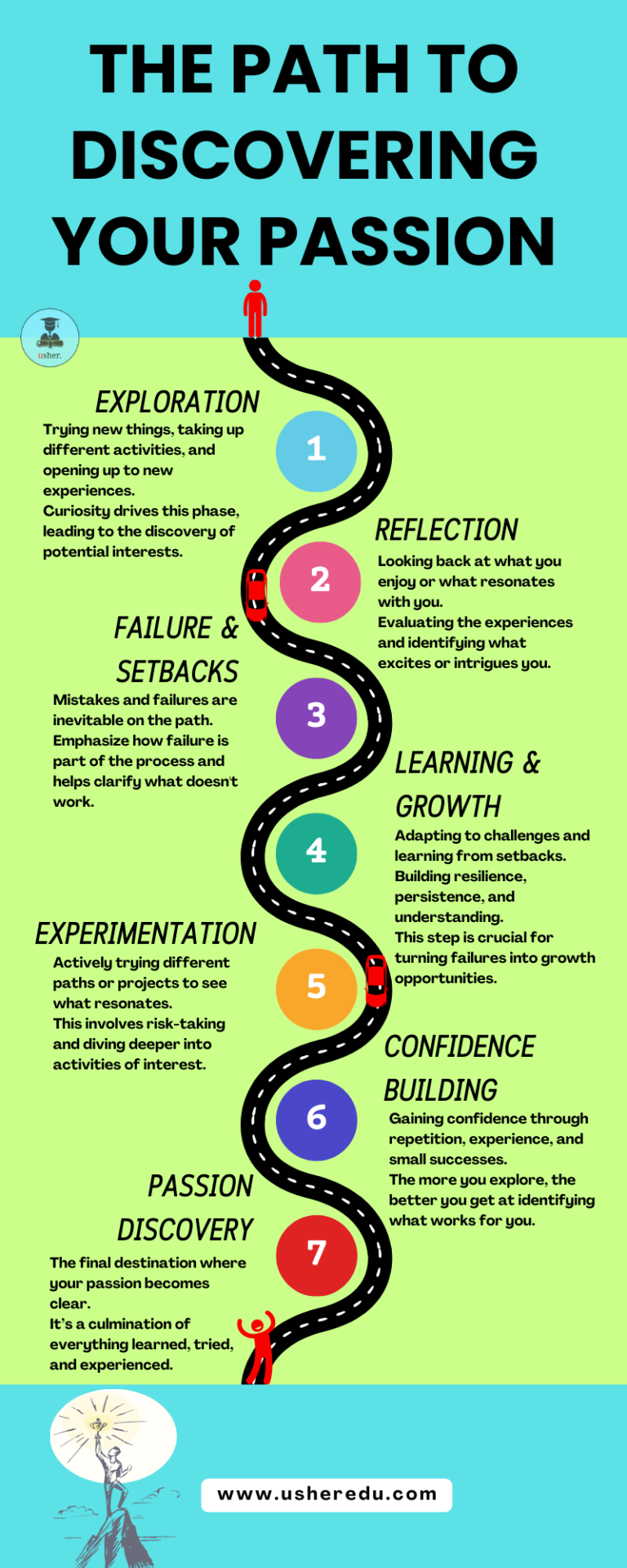Why Finding Your Passion is Essential for Students
School can sometimes feel like a rigid path filled with assignments, tests, and deadlines.
But beyond the hustle of academics lies something much more meaningful—your interests and passions.
These are the things that will inspire you, drive your future, and help you become the person you want to be.
Finding your passion as a student is a critical step towards self-discovery and long-term fulfillment.
Why is this important? Let’s break it down:
- Passion fuels motivation: When you discover something you’re passionate about, it doesn’t feel like work. You want to engage with it, learn more, and grow. This drive is crucial for long-term success.
- Personal fulfillment: Your passion allows you to lead a more fulfilled life. Whether you pursue it as a hobby or a career, doing something you love can provide purpose and happiness.
- Better focus in academics: When you know what excites you, even subjects that don’t initially appeal can become more relevant. For example, a student passionate about environmental science may suddenly find chemistry fascinating, knowing it’s related to their interests.
But how do you discover your passion while still in school?
The answer lies in exploration, reflection, and perseverance.
This guide will help you uncover your unique path, using both self-reflection and external resources, while providing practical, student-friendly strategies.
What Passion and Interest Mean: A Closer Look
Before diving into how to discover your passion, it’s essential to understand the difference between interest and passion.
- Interest: Interests are things you enjoy doing, but they might not be long-lasting or all-consuming. They could be casual hobbies or activities you do in your free time like reading books, drawing, or playing video games. Interests often change, and that’s perfectly okay.
- Passion: Passion, on the other hand, is something much deeper. It’s the thing that gets you excited to get out of bed, the activity that makes you lose track of time, the work you would do even if no one asked you to. It’s what drives you at your core.
It’s easy to confuse these two because most passions start as mere interests. The key to discovering passion is identifying which interests light that fire inside of you and which ones are passing fancies.
As a school student, your journey to finding your passion begins with exploring your interests.
Examples of Passion vs. Interest
- Interest: Enjoying music and occasionally playing an instrument.
- Passion: Composing your own music, practicing for hours without feeling the time pass, and constantly wanting to improve.
- Interest: Watching sports or following your favorite teams.
- Passion: Committing to playing a sport, training every day, learning strategy, and pushing your limits to become better.
Importance of Self-Discovery in School
Self-discovery is a process that starts early in life, and school is the perfect environment to find it.
As a student, you’re exposed to various subjects, extracurricular activities, and social circles, all of which provide opportunities for self-reflection and growth.
Here are a few reasons why self-discovery during your school years is so important:
– A Time for Experimentation
School is often the first place where you get to explore a wide range of activities, from academics to sports to arts. This exposure is invaluable in helping you figure out what excites you and what doesn’t.
Don’t hesitate to experiment. Sign up for different clubs, try new hobbies, and engage in various academic fields.
– Early Discoveries Shape Future Careers
Many passions that shape future careers are discovered during school years. Consider students who discover a love for biology and later become doctors, or those who find joy in writing and pursue careers in journalism. By starting early, you give yourself the time and space to develop your skills and interests into lifelong passions.
– Building Confidence and Independence
The process of self-discovery helps build confidence. As you figure out what you enjoy and what you’re good at, you become more self-assured. This confidence is essential for pursuing your passions, overcoming challenges, and developing independence.
Steps to Discovering Your Passion: Practical Strategies for Students
Finding your passion is not always straightforward, but there are proven strategies that can help you navigate this journey.
Below are the steps you can take as a student to uncover your passions.
Step 1: Try a Wide Variety of Activities
It’s impossible to know what you’ll love without trying new things.
School offers numerous opportunities to explore different areas, from extracurricular activities to subject electives. Be open to trying activities outside your comfort zone.
For example, if you’ve always been inclined towards science, why not try a drama class or join the school newspaper?
If you’ve never been interested in sports, try joining a casual team to see how it feels.
The more diverse your experiences, the better chance you have of finding something that truly excites you.
- Join school clubs: From debate teams to science clubs, joining different clubs can expose you to new passions.
- Volunteer: Volunteering is a great way to meet new people and gain hands-on experience in various fields.
- Attend workshops and camps: Schools often offer summer programs or workshops. These can be excellent opportunities to explore subjects like robotics, art, or leadership.
Step 2: Reflect on What You Enjoy and Why
As you try different activities, it’s essential to reflect on your experiences. Self-reflection is a crucial part of discovering your passion. After each new activity or experience, ask yourself:
- Did I enjoy this?
- Why did I enjoy it?
- Would I want to continue doing this, even if it became challenging?
Sometimes, you may not immediately love something, but it grows on you with time.
Pay attention to activities that spark curiosity and interest, even if you don’t feel an instant passion for them.
Step 3: Pay Attention to What Excites You Outside of School
Your passion might not be tied to traditional school subjects. Many students discover their passions in activities outside of the classroom.
If you love coding, creating YouTube videos, or playing video games, these can lead to deep interests that develop into passions.
- Do you love drawing or painting? Maybe you’re an artist at heart.
- Do you spend hours watching science documentaries? Perhaps there’s a scientist inside you.
- Are you obsessed with video games and how they work? Game development might be the path for you.
Journaling your daily activities can help. Keeping a journal or note of your feelings about certain activities can highlight patterns in what excites or bores you.
How to Discover Your Strengths and Weaknesses
One of the most effective ways to find your passion is by recognizing your strengths and weaknesses.
Passion often stems from areas where you excel or feel most confident. When you’re good at something, you’re more likely to enjoy it because it feels rewarding.
Ways to Identify Your Strengths
- Ask for feedback: Sometimes, the people around us can see our strengths more clearly than we can. Ask your teachers, parents, or friends for honest feedback about what they think you’re good at.
- Take personality and career assessments: Online assessments, such as the Myers-Briggs Type Indicator or the Holland Code Career Test, can give you insights into your strengths and interests.
While these tests are not definitive, they provide a helpful starting point. - Analyze your school performance: Which subjects or projects do you excel at? What do you enjoy doing the most during your school day?
Look for patterns in your academic performance to uncover potential strengths.
How to Deal with Weaknesses
While it’s important to focus on your strengths, acknowledging your weaknesses is also valuable.
Weaknesses don’t mean failure, instead they are used to provide areas for growth and improvement.
Sometimes, what starts as a weakness can turn into a strength through perseverance and practice. Recognizing your weaknesses can also help you determine what’s not a passion.
For example, if you struggle with math and it doesn’t excite you, it’s okay to acknowledge that math might not be your passion.
By recognizing this, you can focus your energy on areas that genuinely interest you.
Why Extracurricular Activities Are Key to Finding Your Passion
One of the best ways to discover your passion is through extracurricular activities.
These activities offer a chance to explore new fields outside of the traditional academic environment. They also provide hands-on experience, which can be instrumental in finding what you enjoy most.
Role of Extracurriculars in Passion Discovery
- Exploration without pressure: Extracurricular activities give you a chance to try new things without the pressure of grades. Whether it’s joining a theater group, trying a sport, or participating in a school club, these activities allow you to explore your interests in a relaxed setting.
- Skill development: Many extracurricular activities help build skills that may align with your passion. For example, joining a debate club can sharpen your public speaking skills, while being part of a science club can nurture your curiosity and problem-solving abilities.
- Networking and social interaction: Extracurriculars are also a great way to meet like-minded people who share similar interests. Surrounding yourself with people who have similar passions can fuel your enthusiasm and open new doors for collaboration and growth.
Examples of Extracurricular Activities
- Drama and theater clubs: Great for students interested in the arts, public speaking, or acting.
- Sports teams: Help develop discipline, teamwork, and leadership skills.
- Student government: Ideal for those passionate about leadership, politics, or community service.
- Music and arts clubs: For students who are creative or musically inclined.
- STEM clubs: Perfect for those interested in science, technology, engineering, or math.


Role of a Growth Mindset in Passion Discovery
A growth mindset is the belief that you can improve and grow through effort, persistence, and learning.
This mindset is crucial for discovering your passion because it encourages you to embrace challenges and view failures as opportunities for growth.
How a Growth Mindset Helps in Finding Passion
- Embracing failure: Not every activity you try will become your passion, and that’s okay. A growth mindset helps you see failures as valuable learning experiences rather than dead ends.
- Overcoming challenges: Finding your passion may not always be easy. A growth mindset will encourage you to push through challenges and keep experimenting until you find what you truly love.
- Continual exploration: When you adopt a growth mindset, you remain open to trying new things throughout your life. This mindset ensures that even if your passion changes over time, you’re always willing to explore new interests.
Example: Let’s say you try coding for the first time and find it difficult. With a fixed mindset, you might think, “I’m just not good at coding,” and give up. But with a growth mindset, you’d approach it with curiosity and persistence, asking, “What can I do to improve my coding skills?” This approach could eventually lead to a passion for technology.
Tools and Resources to Help You Find Your Passion
If you’re still unsure about where to start, there are several tools and resources designed to help students discover their strengths, interests, and potential passions.
Here’s a breakdown of some helpful resources:
Online Personality and Career Tests
- 16Personalities (Myers-Briggs): This test helps you understand your personality type, which can provide insights into what careers or hobbies might align with your strengths and preferences.
- Holland Code Career Test: Based on Dr. John Holland’s theory of career choice, this test helps you discover careers that suit your interests and personality.
Journaling and Reflection
- Keep a journal where you write down your experiences with different activities. Reflect on what you enjoyed and what you didn’t. Over time, patterns will emerge that can point you toward your passion.
Mentorship and Guidance
- Seek advice from teachers, mentors, or career counselors. They can provide guidance based on their own experiences and help you navigate the process of self-discovery.
How to Embrace the Process of Self-Discovery
Finding your passion is a process.
It won’t happen overnight.
It’s important to understand that passions evolve over time, and you may go through phases of exploration before finding what truly excites you.
Why It’s Okay Not to Know Yet
Many students feel pressure to know what they want to do for the rest of their lives, but it’s perfectly normal not to have it all figured out.
Some people find their passions early in life, while others take more time.
The key is to keep exploring and learning. As long as you’re open to new experiences, your passion will eventually reveal itself.
Continual Growth
Even after you’ve found something you’re passionate about, you’ll continue to grow and develop new interests.
Passion is not static, it evolves as you grow as a person.
The most important thing is to stay curious and embrace the journey of self-discovery.
Example: J.K. Rowling didn’t publish her first Harry Potter book until she was in her thirties. She went through various jobs, challenges, and phases before finding her true passion for writing. The journey may not be immediate, but it’s worth the wait.

Conclusion: Embrace the Journey to Find Your Passion
The path to finding your passion is filled with exploration, self-reflection, and perseverance.
Whether you’re a high school student still exploring your interests or someone further along in your journey, this guide will help you take those crucial steps toward a fulfilling, passion-driven life.
You always have incredible opportunities to explore different activities, learn new skills, and discover what truly excites you.
While the journey may take time, each step brings you closer to uncovering the interests that will fuel your future.
Remember, the process is just as important as the destination.
Enjoy every moment of discovering who you are and what makes you passionate. And most importantly, don’t be afraid to try new things.
Your passion could be waiting just around the corner. All the Best!




